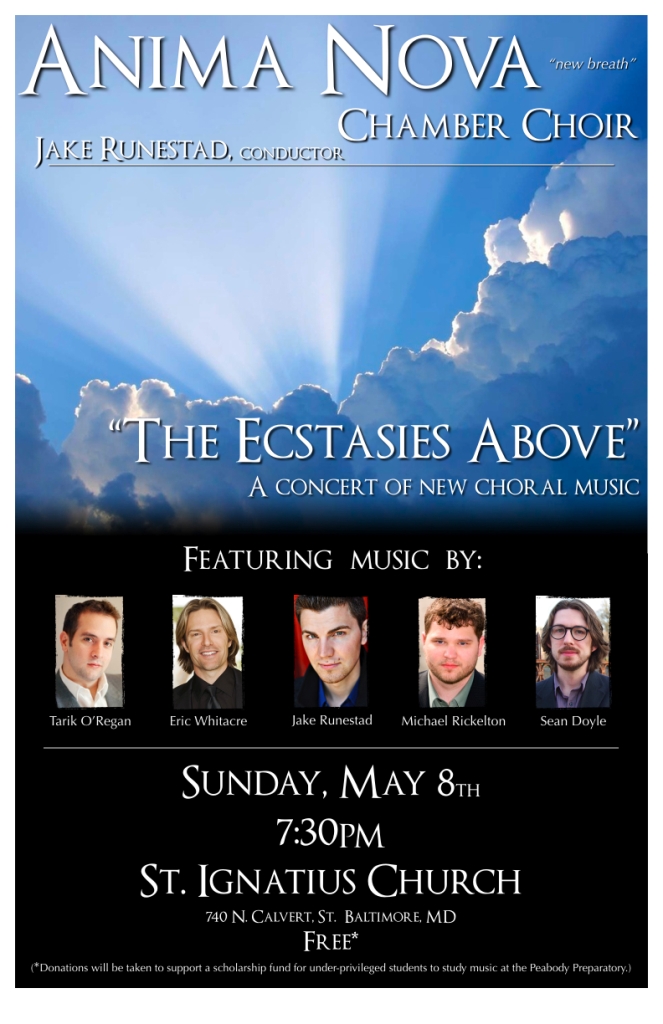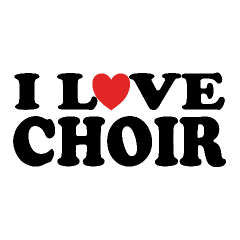And I’m back…
I have left you in the care of two capable guest writers for the last couple of weeks: Jessica Lennick writing about her experiences creating a modern Zerlina and Joan Estep of Opera on Tap – Atlanta. This week we focus our attention on the world of choral singing. Most of us will turn to choral gigs on our glorious path to opera fame. However, choral singing can be much more than just a paycheck or another voice in the crowd. Choral singing provides many benefits for the emerging young professional such as consistent technique evaluation, ensemble singing, and the obvious social benefits.
For experienced singers, choral groups are often a helpful source of income. Depending on your geographic location, many churches offer paid chorister positions and large choirs often employ a section leader to provide consistency. As a professional chorister, you will usually meet at least once a week for rehearsal. This type of regimen focuses on gradual improvement in tone, listening skills, pitch quality, and counting. Of course, these are all things that we train for during our own individual practice sessions. However, the ensemble nature of choirs provides an extra level of accountability. As soloists we are known to perhaps stretch a rhythm here or change a dynamic there. (Who me? Never…) These types of alterations are not allowed in the “checks and balances” world of ensemble singing. Furthermore, being a part of the group can be a source of inspiration and motivation to improve your own musicianship.
In my quest for diva stardom I have been part of many choral groups. I credit these choirs with aiding my development as a musician and for the beginnings of some of my closest friendships. To this day I still participate in choirs in a professional capacity. In fact, I have two upcoming choral performances in which I am proud to participate.
 On Sunday, May 8th at 7:30pm, the brand-spanking-new Anima Nova Chamber Choir, will present a concert of new choral music at St. Ignatius Church (740 N. Calvert St., Baltimore.) This professional ensemble, conducted by Jake Runestad, will perform works by composers Eric Whitacre, Tarik O’Regan, Jake Runestad, Michael Rickelton, and Sean Doyle. The concert is free but donations are highly encouraged as they will be collected to support a scholarship fund for underprivileged students to study music in the Jr. Bach program of the Peabody Preparatory. Jr. Bach is an outreach program in which Peabody Conservatory composers work with students from St. Ignatius Loyola Academy. The students work with their mentors to compose their own works which are performed at the end of the semester by Peabody musicians. A scholarship is given to one outstanding student each year to receive lessons and musical training at the Peabody Preparatory – supporting a generation of young composers.
On Sunday, May 8th at 7:30pm, the brand-spanking-new Anima Nova Chamber Choir, will present a concert of new choral music at St. Ignatius Church (740 N. Calvert St., Baltimore.) This professional ensemble, conducted by Jake Runestad, will perform works by composers Eric Whitacre, Tarik O’Regan, Jake Runestad, Michael Rickelton, and Sean Doyle. The concert is free but donations are highly encouraged as they will be collected to support a scholarship fund for underprivileged students to study music in the Jr. Bach program of the Peabody Preparatory. Jr. Bach is an outreach program in which Peabody Conservatory composers work with students from St. Ignatius Loyola Academy. The students work with their mentors to compose their own works which are performed at the end of the semester by Peabody musicians. A scholarship is given to one outstanding student each year to receive lessons and musical training at the Peabody Preparatory – supporting a generation of young composers.
The cornerstone piece, The Ecstasies Above (for choir, two solo vocal quartets, and string quartet) by British composer Tarik O’Regan, is a setting of Edgar Allan Poe’s Israfel (nice Baltimore tie-in) and one of the finest pieces written for choir in the last 20 years. The concert will also feature the première of Vocalise Mystique by Baltimore-based composer Jake Runestad.
Now, this is an opportunity I could hardly turn down. As an ardent supporter of modern music for classical voice, I cannot help but encourage young composers in their musical studies. On the flip side of the coin, my other impending concert is a foundational piece of choral repertoire: Mozart Requiem. I have sung the alto soloist for this many times in the past, but as a professional chorister for the Handel Choir of Baltimore, I will be dutifully doing my part in the alto section. And frankly, it is so nice to sing Requiem again, even without the solos.
On Sunday, May 15, 2011 at 4pm (also at St. Ignatius Church) Handel Choir of Baltimore presents two of the most eloquent final musical statements ever written: Mozart’s Requiem for soloists, chorus and orchestra and portions of Bach’s final masterpiece, The Art of the Fugue, performed by Harmonious Blacksmith. Soloists: Emily Noël, soprano; Monica Reinagel, contralto; Aaron Sheehan, tenor; Jason Hardy, bass will be featured. Harmonious Blacksmith combines the best of creative conceptual programming with the fire of virtuoso performing and improvising. Uniquely focused on the connection between composition and improvisation in Renaissance and Baroque music, Harmonious Blacksmith looks back to the age-old practices of improvising dance music and ornamenting songs. Harmonious Blacksmith has been praised for its “dazzling display of virtuosity,” “nimble performances,” “finesse and flourish at the keyboard” and “lively, enthusiastic and expressive in their playing.” Winston Salem Journal, Baltimore Sun and American Recorder Society Magazine.
If you are in the Baltimore area, please take an evening (or afternoon) and attend one of these stunning performances of traditional or contemporary choral music.
Now, tell me about your choral-singing experiences…
What valuable chorister lessons have you learned?
Has choral singing made you a better musician?
What was your best (or worst) choir experience?
Tell me all the details in the comments below…
Related Articles
- L.A. Master Chorale announces 2011-12 season (latimesblogs.latimes.com)
- Leading the world in song — virtually (cnn.com)


